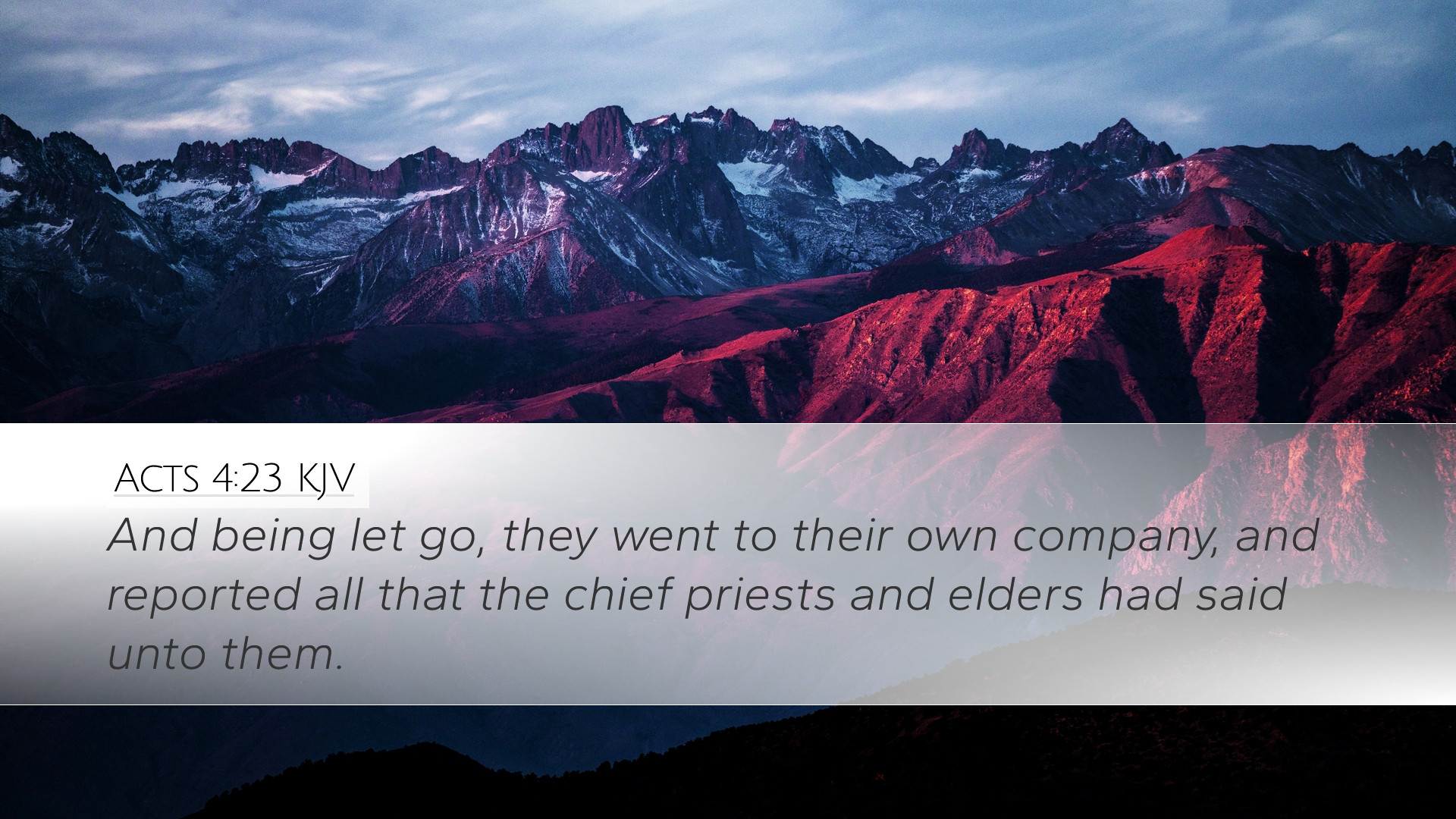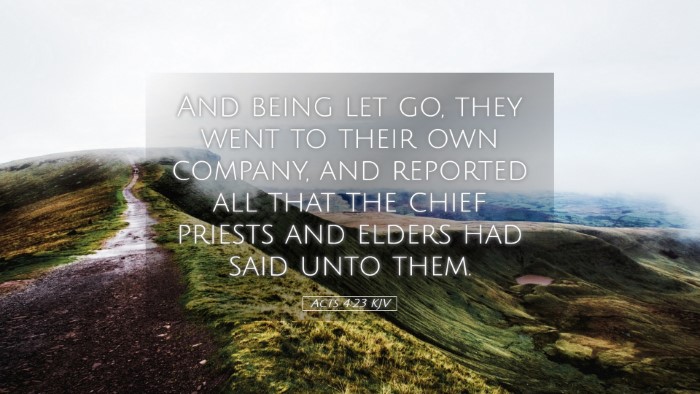Commentary on Acts 4:23
Acts 4:23 states: "And being let go, they went to their own company, and reported all that the chief priests and elders had said unto them." This verse captures a significant moment in the early Church's experience following the boldness displayed by Peter and John after their healing of the lame man and their subsequent arrest. This commentary aims to delve into the implications and teachings found within this verse, drawing insights from prominent public domain commentaries.
Contextual Background
The verses leading up to Acts 4:23 depict the early struggles of the Apostles. Following their miraculous acts and the preaching of the gospel, Peter and John are arrested and interrogated by the Jewish authority. They boldly proclaim their allegiance to Christ, despite threats and intimidation. Once released, they return to their fellow believers, expressing their collective relationship in Christ and the impact of persecution on their mission.
Insights from Matthew Henry
Matthew Henry remarks on the unity and fellowship of the believers, highlighting that Peter and John sought the company of their fellow disciples after their release. This demonstrates the vital role of community in the face of persecution:
- The Importance of Community: Henry emphasizes that the apostles returned to “their own company,” indicating that believers naturally seek to be with those who share their faith during challenging times. In fellowship, believers find support, comfort, and strength through shared experiences.
- Reporting the Events: They “reported all” that had transpired, illustrating transparency and the practice of sharing burdens within the Church. This sharing aids in building faith and encouraging one another in the mission.
- Reacting to Opposition: Henry notes that their return was not marked by fear but rather a readiness to engage in prayer and seek God’s guidance. Their response illustrates the early Church's resilience and reliance on divine power rather than human authority.
Insights from Albert Barnes
Albert Barnes adds depth by highlighting the significance of their return to the community following a challenging encounter with Jewish leaders:
- Gathering for Prayer: Barnes points out that this act of returning highlights their dependence on communal prayer and the pursuit of God’s will. The early Church recognized that prayer was essential for empowerment and guidance in their ministry.
- Encouragement in Adversity: He highlights that reporting the threats faced serves not only to inform but to encourage fellow believers. This sharing cultivates a stronger community that stands together in face of adversity.
- The Role of the Holy Spirit: Barnes notes that their experience reflects reliance on the Holy Spirit’s power, which emboldens believers to stand firm amidst persecution. Their approach models how believers can draw strength from divine sources during trials.
Insights from Adam Clarke
Adam Clarke focuses on the theological implications of this verse and emphasizes the early Christian community's dynamics:
- Leadership and Accountability: Clarke remarks on the apostles’ role as leaders who returned to their “own company” to convey experiences authentically, highlighting that leadership is marked by accountability to the community.
- Collective Identity: He emphasizes the collective identity of believers, asserting that the phrase “their own company” denotes a shared purpose and commitment to the mission of Christ. This unity is essential for effective witness and perseverance.
- The Influence of Threats: Clarke discusses how confronting external threats strengthens community resolve. Rather than driving them apart, adversity promotes unity and reinforces their commitment to the Gospel.
Theological Reflections
This verse presents profound theological themes relevant for pastors, students, and theologians today:
- Community and Fellowship: The model of returning to one’s community embodies the essence of Christian fellowship. In times of crises, believers must prioritize gathering for mutual support and intercession. The communal life of the Church is paramount for spiritual growth and resilience.
- Prayer and Dependence on God: The return to communal prayer underscores the significance of seeking God’s guidance. Prayer is the lifeline of the Church, providing strength in weak moments and clarity amid confusion. This reliance lays the foundation for spiritual fortitude against societal pressures.
- Witness and Perseverance: The boldness shown by the apostles encourages believers to witness to their faith despite opposition. Their example teaches that proclaiming the Gospel may invoke challenges but also affords opportunities for God’s glory to be revealed through endurance and collective prayer.
Conclusion
Acts 4:23 encapsulates the early Church's spirit in wielding its communal strength in the face of adversity. The insights from Matthew Henry, Albert Barnes, and Adam Clarke remind contemporary believers of the importance of unity, communal prayer, and resilience in faith. As the early apostles exemplified, returning to the company of believers fosters hope, accountability, and strength to continue the mission of Christ amidst challenges.


